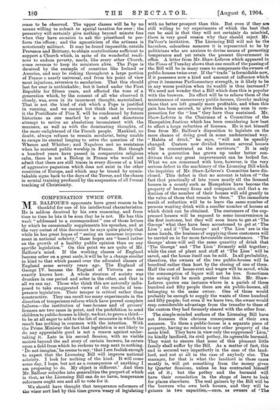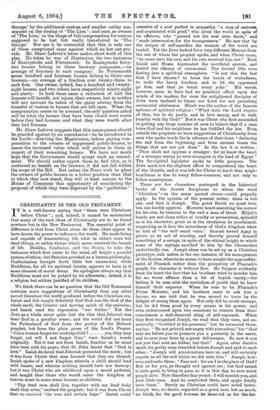AI R. BALFOUR'S opponents have great reason to be thankful for
one of his intellectual characteristics. He is seldom deceived by his own reasoning, and from time to time he lets it be seen that he is not. He has this week " addressed to a correspondent " one of those letters by which he occasionally supplements his speeches, and at the very outset of this document he says quite plainly that while he has great hopes of " seeing an immense improve- ment in national sobriety," these hopes are " based rather on the growth of a healthy public opinion than on any specific legislation." On this point we are quite of Mr. Balfour's mind. If the working classes of England become sober on a great scale, it will be by a change similar in kind to that which passed over the educated classes of England some seventy years ago. The England of George IV. became the England of Victoria no one exactly knows how. A whole stratum of society was drunken in one period and sober in the other, and that is all we can say. Those who think this are naturally indis- posed to take exaggerated views of the results of tem- perance legislation. Their temper is critical rather than constructive. They can recall too many experiments in the direction of temperance reform which have proved complete failures—the institution of beer-houses and of grocers' licenses are two cases in point, and the prohibition to send children to public-houses is likely, we fear, to prove a third— to be at all eager to add to the list of measures in which the result has nothing in common with the intention. With the Prime Minister the fact that legislation is not likely to do any appreciable good is not a reason against under- taking it. Late in his second Session, with no visible motive beyond the sad story of certain brewers, he enters upon a field from which he reckons to reap next to nothing. Do not imagine,' he seems to say, that I am foolish enough to expect that the Licensing Bill will improve national sobriety. I look for nothing of the kind. It will come some day, I hope, but not as a consequence of anything I am proposing to do. My object is different.' And then Mr. Balfour subsides into generalities the purport of which is that, as the Licensing Bill can do no harm, temperance reformers ought one and all to vote for it.
We should have thought that temperance reformers of the wiser sort had by this time grown weary of legislating with no better prospect than this. But even if they are still willing to try experiments of which the best that can be said is that they will not certainly do mischief, there is very good reason why they should reject Mr. Balfour's invitation. The Licensing Bill will not be the harmless, colourless measure it is represented to be by politicians who are anxious to devise means of promoting temperance and yet retain the present Government in office. A letter from Mr. Shaw-Lefevre which appeared in the Times of Tuesday shows that one result of the passing of the Bill will be in many cases to compensate the owners of public-houses twice over. If the " trade " is formidable now, if it possesses now a kind and amount of influence which gives it immense Parliamentary strength, is it likely to be in any worse position when its wealth is thus increased P We need not wonder that a Bill which does this is popular with the brewers. Its effect will be to relieve them of the maintenance of unnecessary public-houses, thereby making those that are left greatly more profitable, and when this gain has been secured, to give them a lump sum in com- pensation for the " loss " they have thus sustained. Mr. Shaw-Lefevre is the Chairman of a Committee of the Hampshire Justices which has been considering how best to effect a large reduction of licenses. He is not himself free from Mr. Balfour's disposition to legislate on the mere chance of doing good in some undetermined way. " Habits of drink," he says, " will not be speedily changed. Custom now divided between several houses will be concentrated on the survivors." It is only when a generation has grown up under better con- ditions that any great improvement can be looked for. What we are concerned with here, however, is the very serious defect in the machinery of the Licensing Bill which the inquiries of Mr. Shaw-Lefevre's Committee have dis- closed. This defect is that no account is taken of " the fact that practically of late years nearly all the licensed houses in a county such as Hampshire have become the property of brewery firms and companies, and that a re- duction of the number of their houses will add greatly to the value of those that remain to them." The immediate result of reduction will be to leave the same number of persons wanting drink with a smaller number of houses at which drink can be obtained. The customers of the sup- pressed houses will be exposed to some inconvenience in the first instance, but they will soon learn to get at The George' what they have been accustomed to get at The Lion ' ; and if The George ' and The Lion ' are in the same hands, the business of supplying these customers will be carried on in far more favourable circumstances. The George' alone will sell the same quantity of drink that The George' and The Lion' formerly sold together; while the cost of plant and staff at The Lion' will b saved, and the house itself can be sold. In all probability, therefore, the owners of the two public-houses will be benefited rather than hurt by the closing of one of them. Half the cost of house-rent and wages will be saved, while the consumption of liquor will not be less. Sometimes the saving will be much greater than this. Mr. Shaw- Lefevre quotes one instance where in a parish of three hundred and fifty people there are six public-houses, all belonging to the same owner. One of these would probably be enough to supyly the wants of three hundred and fifty people; but even if we leave two, the owner would reap considerable advantage from the transfer to these of the custom they had formerly shared with the other four.
The simple-minded authors of the Licensing Bill have not foreseen this obvious consequence of their own measure. To them a public-house is a separate piece of property, having no relation to any other property of the same kind. They have in view only the suppressed' Lion,' its kindly landlord, its civil potboy, its agreeable barmaid. They want to ensure that none of this pleasant little family shall suffer by the Bill. As a matter of fact, this end is secured very imperfectly in the case of the land- lord, and not at all in the case of anybody else. The manager, for that is what the landlord in these cases mostly is, will get something from the money given by Quarter Sessions, unless he has contracted himself out of it ; but the potboy and the barmaid will have their consolation in the shape of leave to look for places elsewhere. The real gainers by the Bill will be the brewers who own both houses, and they will be gainers in two capacities,—once. as owners of The George,' by the additional custom and smaller outlay con- sequent on the closing of ' The Lion' ; and once, as owners of The Lion,' in the shape of full compensation for custom supposed to be lost but really transferred to The George.' Nor can it be contended that this is only one of those exceptional cases against which no law can pro- vide. Mr. Shaw-Lefevre's letter makes short work of this plea. He takes by way of illustration the two instances of Basingstoke and Portsmouth. In Basingstoke forty- two houses belong to three brewery companies,—an average of fourteen to each company. In Portsmouth seven hundred and fourteen houses belong to thirty-one brewers,—an average of a fraction over twenty-three to each firm. One owner, indeed, has a hundred and twenty- eight houses, and two others have respectively ninety-eight and ninety. In both these cases a reduction of half the licenses will benefit, not injure, their owners, but in neither will any account be taken of the gains arising from the transfer of custom to houses that are left open. When the compensation comes to be assessed, the only question asked will be what the houses that have been closed were worth before they had licenses, and what they were worth after they had licenses.
Mr. Shaw-Lefevre suggests that this consequence should be guarded against by an amendment—to be introduced in the Lords—directing the Magistrates, before paying com- pensation to the owners of suppressed public-houses, to assess the increased value which will accrue to them in respect of their remai g houses. We have not much hope that the Government would accept such an amend- ment. We should rather expect them to feel that, as it conferred no benefit on the brewers, it did not fall within the scope of the Bill. But unless the Peers wish to place the owners of public-houses in a better position than that in which they now stand, they will at least restore to the House of Commons that opportunity of considering the proposal of which they were deprived by the " guillotine."







































 Previous page
Previous page